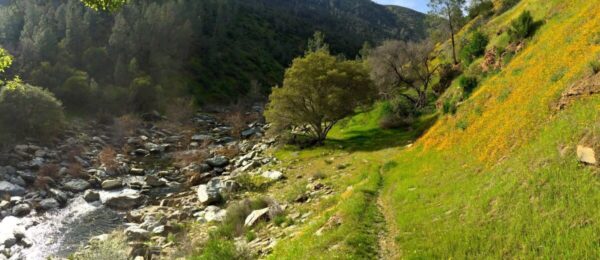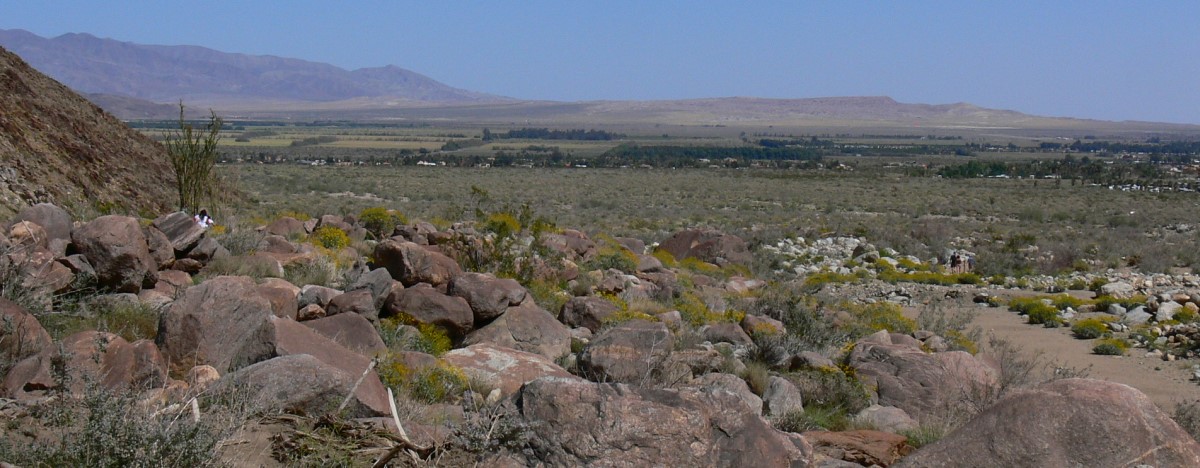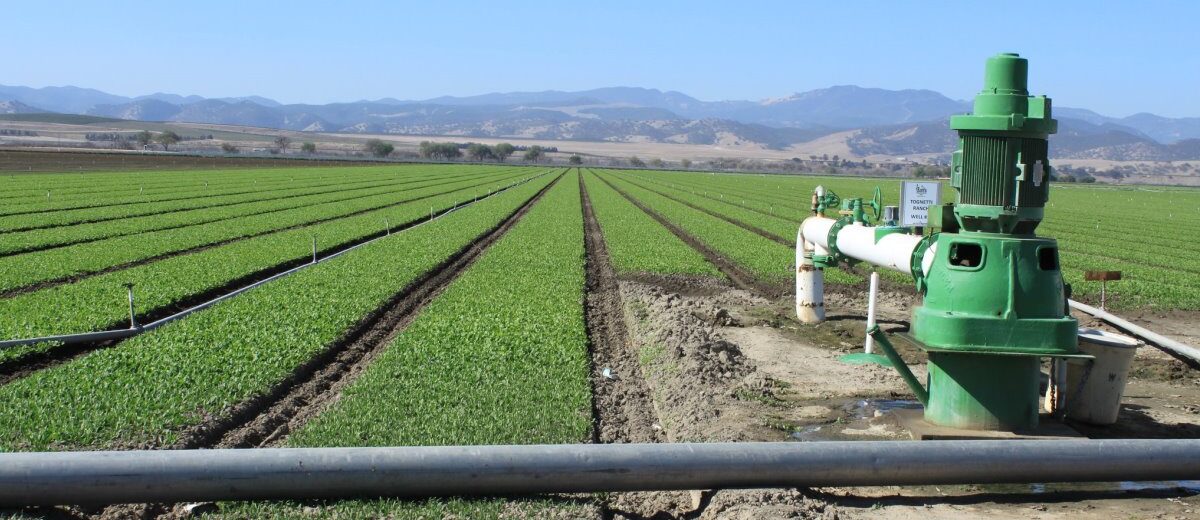What’s next for the community of Borrego Springs and the future of Borrego’s water and land-use planning?
Borrego Springs – Southern California, but a World Apart
A four part series from the Local Government Commission
“Amidst drought, groundwater regulation, and economic hardship, the media portrays Borrego Springs as a village “drying up” in the desert – running out of water – soon to be the next California ghost town.
Like many aspects of the desert, there’s more to the Borrego Springs community than meets the eye. In the crevices of the valley’s rocky floor, wildflowers blossom in exuberant hope. In the shade of the Palo Verde trees, Coyote Creek babbles through the sandy slopes with perseverance.
From corner to corner, the community is banding together: evaluating how to live within the constraints of this remote locale, charting a course that integrates civic engagement with environmental, social and economic priorities – to achieve their goal of a thriving, resilient future.
This is their story. … ”
Read more from the Local Government Commission here: Borrego Springs – Southern California, but a World Apart
Saving Borrego’s Lifeblood
“Borrego Springs’ only viable water source is a large aquifer under Borrego Valley; it has long been accepted that the aquifer’s water collected over millennia and is being pumped at a rapid pace by recent generations. What farmers, developers, business owners, and residents never agreed upon was how much water was actually available, and how long it would last.”
Read more from the Local Government Commission here: Saving Borrego’s Lifeblood
Community Voices
“LGC, with the help of five Stanford University students, conducted interviews with community members to understand varying perspectives and identify where community visions overlap in order to help guide the community on a path forward. Ten Borregans lent their voices to these interviews, including full-time residents, commuters, and weekenders.”
Read more from the Local Government Commission here: Community Voices
Borrego’s Path to Resilience in the Face of Change
“As a new year begins, Borrego Springs is eager for opportunities to ensure community resilience while protecting the local economy and the region’s precious ecosystems. In the face of many obstacles, not all hope is lost. This article wraps up the four-part series, highlighting the revitalization of the Borrego Valley Stewardship Council and their efforts to pave the way for a brighter future.”
Read more from the Local Government Commission here: Borrego’s Path to Resilience in the Face of Change
IMAGE CREDIT: Photo of Borrego Springs by Jim Mullhaupt
SGMA IN ACTION: Challenges and opportunities, Environmental justice considerations, and first lawsuits over GSP plans
 Critically overdrafted groundwater basins submitted their Groundwater Sustainability Plans (GSPs) in January 2020, and high and medium priority subbasins will be submitting their GSPs in 2022. At the Environmental Law Conference at Yosemite, a panel provided an update on Sustainable Groundwater Management Act implementation, including issues being litigated in first impression lawsuits across the state. Best practices for groundwater allocation and trading, and incorporation of environmental justice concerns into GSPs. How agencies address CEQA compliance for GSA Project and Management Actions were also discussed.
Critically overdrafted groundwater basins submitted their Groundwater Sustainability Plans (GSPs) in January 2020, and high and medium priority subbasins will be submitting their GSPs in 2022. At the Environmental Law Conference at Yosemite, a panel provided an update on Sustainable Groundwater Management Act implementation, including issues being litigated in first impression lawsuits across the state. Best practices for groundwater allocation and trading, and incorporation of environmental justice concerns into GSPs. How agencies address CEQA compliance for GSA Project and Management Actions were also discussed.
The panelists:
 Eric Averett, general manager of Roseville-Rio Bravo Water Storage District: Since 1991, Eric has been actively involved in evaluating and resolving water supply and quality challenges facing Kern County. Eric Averett serves as president of the Kern River Watershed Coalition. He sits on the board of directors for the Water Association of Kern County and the Association of California Water Agencies.
Eric Averett, general manager of Roseville-Rio Bravo Water Storage District: Since 1991, Eric has been actively involved in evaluating and resolving water supply and quality challenges facing Kern County. Eric Averett serves as president of the Kern River Watershed Coalition. He sits on the board of directors for the Water Association of Kern County and the Association of California Water Agencies.
Camille Pannu, a visiting clinical law professor at the Community and Economic Development Clinic at UC Irvine School of Law: Prior to joining UC Irvine, she served as the inaugural director for the Water Justice Clinic at UC Davis School of Law, the first clinic of its kind in the country. Her practice uses administrative advocacy, strategic research, and transactional legal tools to address the impact of racial and economic inequality on access to clean, safe drinking water in California’s low-income communities.
Tom Lippe, public interest environmental law attorney: He has been actively involved since 1987 in cases dealing with land use, CEQA, NEPA, surface water, groundwater, coastal protection, and endangered species. Mr. Lippe’s practice has included many cases involving the effects of land-use changes on groundwater resources and the effects of groundwater consumption on streamflow and endangered salmonids. Mr. Lippe is currently litigating two cases challenging groundwater sustainability plans adopted under the Sustainable Groundwater Management Act for the Eastern San Joaquin and Delta-Mendota groundwater basins.
The panel was moderated by Natalie Stork, chief of the Groundwater Management Program at the State Water Resources Control Board, which is responsible for the board’s implementation of SGMA.
CA WATER COMMISSION: Merced River Watershed Flood MAR Study
 Kamyar Guivetchi, Manager of DWR’s Division of Planning has often referred to Flood Managed Aquifer Recharge (or Flood MAR) as a “moon shot” for recharging depleted groundwater basins, but just how much Flood MAR can contribute to groundwater recharge in a watershed is unknown. However, the Department of Water Resources’ Integrated Watershed Management staff is underway with a pilot study to look at the potential for Flood MAR in the Merced River watershed.
Kamyar Guivetchi, Manager of DWR’s Division of Planning has often referred to Flood Managed Aquifer Recharge (or Flood MAR) as a “moon shot” for recharging depleted groundwater basins, but just how much Flood MAR can contribute to groundwater recharge in a watershed is unknown. However, the Department of Water Resources’ Integrated Watershed Management staff is underway with a pilot study to look at the potential for Flood MAR in the Merced River watershed.
At the October meeting of the California Water Commission, Mr. Guivetchi and David Arrate, Senior Water Resources Engineer with the Department of Water Resources, gave a presentation on the study and shared some of the preliminary results.
NEW Video Gallery at the Groundwater Exchange
At the Groundwater Exchange, we’re working to update the website and adding new features.
One of those is the new Video Gallery, where you can find introductory videos on SGMA, SGMA videos in Spanish, and special topic videos on groundwater recharge, Integrated Regional Water Management, and more!
Check out the new video gallery by clicking here.
The Groundwater Exchange video gallery can link to videos posted on YouTube, Vimeo, or Facebook, so if you have a video to add, send the link to maven@mavensnotebook.com.
Enjoy!
SGMA in the News
Farmland consolidations could save water, promote solar
“Hopes are rising in the southern Central Valley that the farmland expected to be fallowed in coming years because of drought and groundwater restrictions won’t sit idle but will instead be consolidated to make room for new land uses including solar power generation. Efforts are underway locally to create a system for piecing together parcels that would allow investment at a scale large enough to support substantial photovoltaic solar arrays — or ranching or creation of natural habitat, whatever makes sense financially for landowners. … ” Read more from the Bakersfield Californian here: Farmland consolidations could save water, promote solar
Western agricultural water values diverge, with expansion in permanent and high-value crops
Westwater Research writes, “Recent trends in the Western U.S. toward high-value and capital-intensive crops that depend on irrigation are changing the importance and value of water in agriculture, and such changes have important implications for water trading and water market prices. WestWater compiled data on agricultural sales and irrigation water use to provide a unique spatial look at the value of water in agricultural use across the Western states. Please enjoy a short Water Market Insider summarizing the data on agricultural water values, and feel free to take a closer look with our online GIS story-board.”
Ridgecrest City Council, IWVGA agree on recycled water
“If an options agreement between the city council and the Indian Wells Valley Groundwater Authority comes to fruition, recycled water from the city’s wastewater facility could help balance the groundwater basin — and could potentially help Searles Valley Minerals stay in business. Sources at SVM, however, have said that while they are open to ideas “at this juncture recycled water for Searles is only a concept.” Both the council and the groundwater authorities at their respective meetings last week approved the option agreement between the two parties for recycled wastewater. … “ Read more from the Ridgecrest Independent here: Ridgecrest City Council, IWVGA agree on recycled water
Developing groundwater allocations: Findings and recommendations
As groundwater sustainability agencies prepare their plans to meet the requirements of the Sustainable Groundwater Management Act (SGMA), they will likely utilize a variety of tools to achieve sustainability. In many subbasins, groundwater overdraft conditions will require GSAs to impose reductions in pumping in order to achieve sustainable conditions in the subbasin. To do this, GSAs will need set a limit or “cap” on the overall amount of groundwater that is removed from the subbasin, assigning portions of this capped amount to groundwater pumpers in the form of a pumping allocation.
Making pumping allocation decisions will be a difficult task for GSAs, as it will require restricting access to groundwater resources upon which the agricultural community, cities and towns, and others depend. Adding further complexity to the task, SGMA explicitly states that it does not alter water rights, which means groundwater sustainability agencies have to carefully navigate between the confines of water rights and SGMA requirements in developing and implementing their groundwater sustainability plans.
At the 3rd annual Western Groundwater Congress, hosted online by the Groundwater Resources Association of California in September of 2020, Dr. William Blomquist, a Professor of Political Science and more at Indiana University-Purdue University Indianapolis, gave a presentation of ongoing research he is doing with Dr. Christina Babbitt, California Groundwater Manager at the Environmental Defense Fund looking at how other groundwater basins have developed groundwater allocations.
A Craigslist for water trading? Learn how this new water management platform works
 Eric Averett is general manager of the Rosedale-Rio Bravo Water Storage District in Kern County, California, which is one of 21 regions required by the state to balance groundwater demand and supply within 20 years under the Sustainable Groundwater Management Act. Rosedale is home to approximately 27,500 acres of irrigated cropland and 7,500 acres of urban development. Groundwater demand there exceeds supply by approximately 5,000 acre-feet per year. To inform landowners about their water budgets, Rosedale partnered with EDF, Sitka Technology Group, WestWater Research and local landowners to co-develop a new online, open-source water accounting and trading platform. We asked Eric to answer a few questions about how the platform will help local landowners and how it can be expanded to other parts of the Central Valley.
Eric Averett is general manager of the Rosedale-Rio Bravo Water Storage District in Kern County, California, which is one of 21 regions required by the state to balance groundwater demand and supply within 20 years under the Sustainable Groundwater Management Act. Rosedale is home to approximately 27,500 acres of irrigated cropland and 7,500 acres of urban development. Groundwater demand there exceeds supply by approximately 5,000 acre-feet per year. To inform landowners about their water budgets, Rosedale partnered with EDF, Sitka Technology Group, WestWater Research and local landowners to co-develop a new online, open-source water accounting and trading platform. We asked Eric to answer a few questions about how the platform will help local landowners and how it can be expanded to other parts of the Central Valley.
How water justice groups view groundwater sustainability planning
Over-pumping of groundwater has caused domestic wells to go dry in the San Joaquin Valley. Yet many of the first round of plans prepared to comply with the Sustainable Groundwater Management Act (SGMA) do not yet propose ways to address this problem. We explored groundwater planning with three members of the environmental justice community—Angela Islas of Self-Help Enterprises, Justine Massey of the Community Water Center, and Amanda Monaco of the Leadership Counsel for Justice and Accountability.
SGMA in the news
Groundwater regulation in Ukiah Valley is imminent. Here’s what you need to know.
“Historically, in California, if someone had a well, or access to an aquifer on their property, they could take as much water out of it as they wanted, to irrigate agricultural land, for drinking, or whatever else they needed it for. Currently, there is no government authority that can track or limit groundwater use. Soon, that will change. In 2014, a state law was enacted that requires local governments in areas with potential for groundwater overdraft to establish a regulatory plan to manage groundwater sustainably for years to come. … ” Read more from the Mendocino Voice here: Groundwater regulation in Ukiah Valley is imminent. Here’s what you need to know.
Water accounting platform is working well in Kern County
“A relatively new water budgeting platform appears to be working well for producers in Kern County. The Rosedale-Rio Bravo Water Storage District (District) has worked with multiple stakeholder partners to develop the Water Accounting Platform to help growers more accurately track water use. General Manager of the District, Eric Averett explained that producers in the area seem to be pleased with the functionality of the platform and what it provides. … ” Read more from Ag Net West here: Water accounting platform is working well in Kern County
Ridgecrest: Indian Wells Valley Groundwater Authority responds to Searles Valley Minerals’ lawsuit
“The Indian Wells Valley Groundwater Authority has responded to the Searles Valley Minerals lawsuit announced last week. “At its core, Searles’ lawsuit is nothing more than a claim that its use of water for a commercial industrial purpose should be free of all costs and given a priority over and above all other uses in the Basin,” Mick Gleason, IWVGA chairman and Kern County Supervisor, said in a press release Tuesday morning. … ” Read more from the Ridgecrest Independent here: Indian Wells Valley Groundwater Authority responds to Searles Valley Minerals’ lawsuit
Ridgecrest: Western Growers Association and Calif. Farm Bureau: Current GSP ‘will decimate agriculture’
“The Western Growers Association and the California Farm Bureau Federation voiced its concerns regarding the Indian Wells Valley Groundwater Authority’s draft groundwater sustainability plan in a letter addressed to the IWVGA and its chair, Mick Gleason. “It is shocking that the IWVGA Plan reserves 100 percent of the basin’s sustainable yield to the U.S. Navy — an entity expressly not subject to SGMA or the Plan — and denies overlying landowner farmers any groundwater allocation at all unless they pay the Authority $2,130 per acre-foot,” the letter reads. … ” Read more from the Taft Midway Driller here: Western Growers Association and Calif. Farm Bureau: Current GSP ‘will decimate agriculture’
Groundwater: Desert valley plan could price farms out of business
“As local groundwater agencies throughout California consider how to implement the Sustainable Groundwater Management Act, two lawsuits against a Kern County groundwater sustainability agency show the potential implications for agriculture and other businesses with historic, overlying water rights. The cases involve the Indian Wells Valley Groundwater Authority, a groundwater sustainability agency overseeing a critically overdrafted aquifer that covers part of eastern Kern County and parts of Inyo and San Bernardino counties. … ” Read more from Ag Alert here: Groundwater: Desert valley plan could price farms out of business
New federal report show increasing groundwater levels in the Coachella Valley
“A new report by the U.S. Geological Survey (USGS) shows that efforts by Coachella Valley Water District (CVWD) to replenish local aquifers in the Coachella Valley have been effective, leading to stable land surface elevations in most of the Coachella Valley. Areas with land subsidence identified in prior studies are now stable, uplifting, or experiencing substantial slowing of subsidence. CVWD partners with Coachella Water Authority, Desert Water Agency, Indio Water Authority, and Mission Springs Water District to manage groundwater in the Coachella Valley. “The study shows that CVWD’s commitment to these partnerships and the sustainability of the aquifer that supplies most of our drinking water is a success story,” said Jim Barrett, General Manager of CVWD. “The results clearly demonstrate a reversal in trends of groundwater-level declines during previous decades. This is good news for the long-term health of the aquifers.” … ” Read more from the Coachella Valley Water District here: New federal report show increasing groundwater levels in the Coachella Valley
How groundwater managers can avoid the courts as they divvy up water

From the Environmental Defense Fund:
One of the biggest challenges to implementing California’s Sustainable Groundwater Management Act hovers around this two-part question:
Who gets to pump groundwater and how much do they get to pump? Or, put another way, who must cut their groundwater use and by how much?
As local groundwater agencies try to answer this difficult question on how to develop allocations, they face one major constraint: They can’t change groundwater rights.
Consequently, the path forward for many groundwater agencies is riddled with legal complexities and questions around equity that shouldn’t be ignored.
Click here to continue reading this article at the Growing Returns blog.


